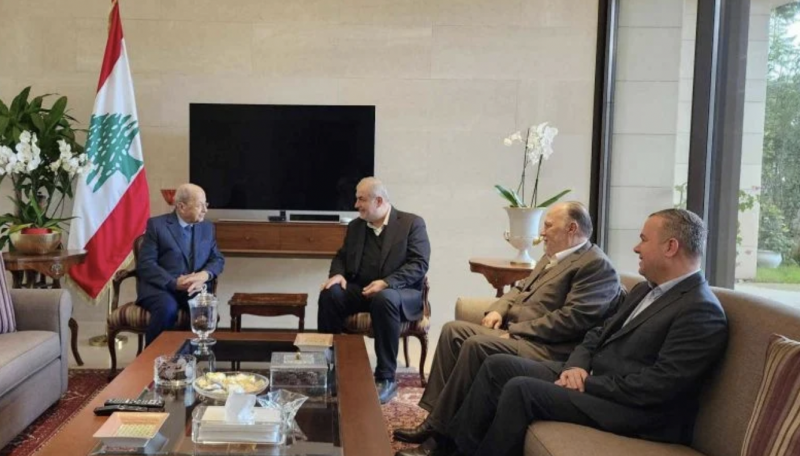
Former President Michel Aoun receiving a Hezbollah delegation, Thursday Mar. 7, 2024, in Rabieh. (Credit: Aoun's press office)
Two weeks following the contentious remarks by former President and Founder of the Free Patriotic Movement (FPM) Michel Aoun lambasting Hezbollah for its activities in southern Lebanon, the message appears to have resonated within the party.
On Thursday, an official delegation spearheaded by the head of Hezbollah’s parliamentary bloc, Mohammad Raad, visited Aoun’s residence in an endeavor to mend fences, amidst a backdrop of escalating differences between the two sides.
Tensions between the two parties have escalated in recent months, primarily fueled by their conflicting stances regarding the presidential election.
Hezbollah’s endorsement of Marada Leader Sleiman Frangieh in this electoral contest has sparked discontent within the FPM.
Additionally, Hezbollah’s close ties with the Amal Movement, a party vehemently criticized by the FPM, have further strained relations between the two sides.
Moreover, the outbreak of hostilities along the Lebanese-Israeli border has intensified criticism from Aoun and his son-in-law and current FPM leader Gebran Bassil toward Hezbollah’s military operations against Israel.
Aoun’s camp remained tight-lipped regarding the specifics of the meeting, with only Hezbollah providing an official statement.
Raad affirmed that the ongoing communication between Aoun and Hezbollah persisted without interruption in the past and will continue to do so in the future.
He emphasized that this state of affairs serves to reassure and pacify the Lebanese populace across all regions and religious denominations.
“The meeting yielded more than positive outcomes,” remarked Hezbollah spokesperson Mohammad Afif Nabulsi.
The visit occurred amidst heightened tensions with the FPM, formerly the sole Christian ally of Hezbollah The meeting was meant to allay Aoun’s concerns regarding the escalation of conflict in Lebanon.
“The delegation members provided comprehensive explanations of the operations on the southern front, emphasizing their defensive nature aimed at safeguarding Lebanon,” Nabulsi said. “This served to reassure Aoun, particularly regarding our steadfast commitment to prevent Lebanon from being embroiled in full-scale warfare.”
Two weeks ago, Aoun vehemently criticized the “resistance,” denouncing cross-border skirmishes with Israel.
“We are not obligated to Gaza by a defense pact ... To claim that involvement in the conflict serves as a deterrent against Israeli aggression is merely a perspective,” he said. The following day, Bassil echoed the same sentiments, expressing opposition to “the principle of unified fronts.”
A heavy debt
While Hezbollah’s engagement in southern Lebanon may have been the final straw for the FPM, relations between the two allies have been strained since Aoun departed from the Baabda Presidential Palace.
In addition to Hezbollah’s persistence in advocating for the presidential candidacy of the Marada leader, extending the mandate of the army’s commander-in-chief, Joseph Aoun, a figure similarly criticized by the FPM, was a contentious issue.
The gulf between the parties has widened due to Hezbollah’s perceived conciliatory stance towards caretaker Prime Minister Najib Mikati. According to the FPM, Mikati has been afforded undue latitude beyond his constitutional authority to govern the country in the absence of a president.
Nevertheless, the topic of the presidential election received only fleeting attention during the meeting at Rabieh.
“The party assured Aoun that its involvement in southern Lebanon was unrelated to the current situation,” said Nabulsi in response to Aoun’s allegations. “He emphasized that the presidential election is strictly an internal matter, pertaining to the blocs and their individual stances.”
“Interpreting the events in Gaza and southern Lebanon as part of a presidential bargain undermines sovereignty,” he added.
Christian unease
Within the broader context of apprehension pervading the Christian community, the FPM perceives this visit as indicative of deeper rifts.
“Hezbollah recognizes the widening chasm between Christians and Muslims, a schism teetering on the brink of irreversibility,” said an FPM official speaking on condition of anonymity due to the sensitivity of the issue.
“Hezbollah’s approach through Michel Aoun underscores its acknowledgment that he represents the least antagonistic Christian faction,” the official added.
What remains unspoken, however, is Hezbollah’s preference for dealing with the former president over Bassil, whom it deems “impulsive” and “unpredictable.” Yet, the conciliatory message extends to the FPM’s leader as well.
Hezbollah’s long-overdue visit to Rabieh likely aims to pave the way for reconciliation with the sole potential Christian ally capable of providing cover for Hezbollah, increasingly marginalized domestically since border conflicts erupted.
“We must demonstrate our sincerity and advocate for responsible dialogue among all concerned parties to address the pressing issues confronting us,” said Raad from Rabieh.
“The crucial point is that this meeting marks a thaw in relations,” said Nabulsi, suggesting that this encounter serves as just the initial step in a broader process.
“I cannot say definitively whether this endeavor will yield results,” a source close to Aoun told L’Orient-Le Jour. “At present, it’s an experiment. Likely, further discussions will ensue with high-ranking party members.”
The prospect of the FPM, including Bassil, pivoting back toward Hezbollah remains uncertain considering the historical context, notably the Mar Mikhael agreement of 2006, which Bassil effectively discarded.
“It’s exceedingly challenging for the FPM to alter its stance,” said an FPM executive. “The wounds run deep.”
Within party circles, there’s a pervasive sentiment that Aoun was betrayed during his presidency. Hezbollah is held responsible for prioritizing its rapport with Parliament Speaker Nabih Berri, often at the expense of the FPM.
The FPM accused Berri of systematically undermining Aoun’s tenure.
“During his presidency, Michel Aoun navigated cautiously, avoiding friction with Hezbollah,” said the FPM executive. “However, now that he’s unburdened from that responsibility, he no longer feels compelled to restrain himself.”
The state of relations between the two groups is perhaps most succinctly captured by the observation of an internet user.
“Even if the relatives of the deceased reconcile, it doesn’t guarantee resurrection,” they posted on a social network on Thursday.
“In any event, the FPM no longer holds sway over Hezbollah,” concluded the FPM executive.
In other words, it is probably up to Hezbollah to give something in return.
This article was originally published in L'Orient-Le Jour. Translated by Sahar Ghoussoub.